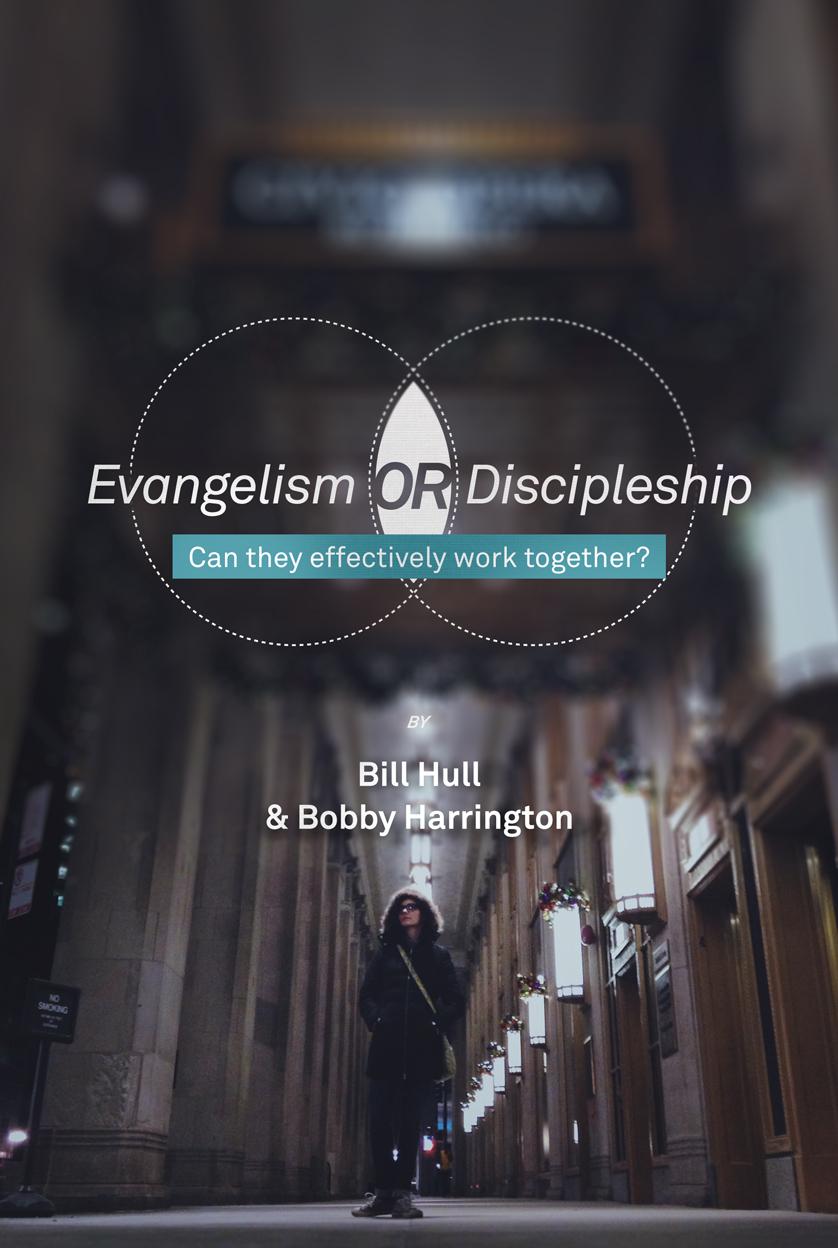Why Discipleship is Better than Evangelism
by Bill Hull and Bobby Harrington
Evangelism is a disrespected word now among many Christians. It may be a good thing. Jesus told us to preach “the gospel” (Mark 13:10), but he never commanded just evangelism. He commanded us to “make disciples.”
He gave his command to make disciples in Matthew 28:19-20. Two subordinate phrases describe how we make disciples. The first part of making disciples is when a person comes to faith in Jesus. Matthew 28:19 sees that process being made concrete through baptism in the name of the Father, Son, and Holy Spirit. We commonly think of this as evangelism. The second part of making disciples is “teaching people to obey all that Jesus commanded.” We commonly think of this second part as discipleship.
But the second part is no more discipleship than the first part. Evangelism and discipleship (as it is commonly understood)—are really the front side and back side of the same coin. The coin is discipleship. Evangelism is simply pre-conversion discipleship.
——————————
Over the years of doing and leading ministry in the local church, we both agree that the church’s most difficult problem is not growth or the revolving door as some might say. But rather, the church’s deepest challenge lies in convincing its citizens that who they are and what they do outside of church services is the real work of God. Some have called it “being in the world,” or “being on mission.”
We think there is wide agreement among church leaders that getting people to do what they should out there is more difficult than getting them to gather in here. For that reason, far too many leaders and churches have dropped the expectation that the common Christian will actually reap any kind of harvest in their normal lives. After all, such an amorphous ideal is impossible to control, difficult to count and may not make the church bigger or more prominent.
But is it possible that discipleship and evangelism are not in competition? Could it be that they are like brothers from the same father? They keep turning up at each other’s parties and special events. People speak of them in the same sentences and name academic courses after them. They’re often at the crux of a question during a panel discussion or study: “What is the relationship of evangelism to discipleship?” Or the more provocative inquiry, “What comes first, evangelism or discipleship—can you have one without the other?”
They might seem in conflict with each other because they share a certain likeness. Maybe we feel the need to focus on, or emphasize, one over the other.
Yet, clearly when you have only one and not both, things do not go well. Evangelism without discipleship tends to be short-lived, focused on packaging, presenting, counting and impressing. Conversion becomes the finish line; all is well, and any further duties are optional.
I (Bobby) grew up as a non-Christian, and I still have lots of non-believing friends. One of my biggest regrets is Gayle, one of our best friends. My wife and I led her to Christ. She seemed so excited and on fire at first. But then it was like she had enough; it required too much of her. And honestly, we could have done better in what we taught her back then. It was as if Gayle made a deal with God; her eternal insurance was purchased. Despite our efforts, she never really got that conversion was about trusting and following Jesus for life. I’m sure you’ve had a Gayle in your own life.
On the flip side, discipleship without evangelism creates the very unhealthy condition of sterility in followers of Christ. Christians who do not evangelize are not fulfilled in their lives, and they take on a certain intramural pettiness. When people are educated beyond their level of obedience, they become religious schizophrenics, experts on what they are not experiencing.
Both discipleship and evangelism are needed. Could it be that evangelism is the front end of discipleship, and maturing those who believe is the back end? When one or the other is lacking, Christians and their churches suffer. More importantly, what Jesus told us to do suffers.
Words matter. So before we go any further, we should define what we mean by evangelism and discipleship.
Evangelism
To some degree, evangelism and discipleship are invented words, coined to describe important functions. Evangelism is rooted in the Greek word euaggelion, meaning good news. Historically, “to evangelize,” meant to announce the Good News. Now, we use evangelism as a catchall term for the entire field of study, research and the process of spreading the gospel.
We can’t hope to thoroughly explore the present state of evangelism in this eBook, but we can identify three observations that may be helpful in describing evangelism in the Western Hemisphere.
1. Universally, evangelical Christians agree that evangelism must be done. And while most of us would never admit it, there is also near universal agreement that you can be a good Christian and not evangelize. We say this with confidence. Consider the recent statistic that less than a quarter of church-going Protestants engage in telling others about Christ in a way that helps the person listening make an informed decision.
2. We have no real consistent expectation that the common believer will reproduce him or herself and teach others in direct response to Christ’s command to make disciples. We need to ask the church’s teachers and members, “What is your reason for not obeying our Lord’s commission to make disciples?”
3. Over the last 50 years, various kinds of aggressive evangelism have not yielded the hoped-for crop of new believers who could have penetrated all domains of society—the domains meant to transform the culture. This has nothing to do with how many have decided to follow Jesus, but rather how many have been taught that they are expected to penetrate their sphere of influence. Evangelicals have been successful in other areas—crusades, public forums, television and new media. These efforts, while an adrenaline rush for Christians, have not touched the national character, especially in the church. The church has lost ground, increasingly living on the margins. And the general public thinks of evangelism as simply bothering people. The good news is that the church is desperate to find a better way, which could be that reaching people is more private than public, and is personal and rooted in relationships. It could be that the solution is hand to hand, person by person, found in the common ordinary situations of life.
Discipleship
Like evangelism, the word “discipleship” is not in the Bible. By adding “ship” to it, discipleship literally means “the state of learning” or “following a teacher.” Some people like to refer to it as apprenticeship, which we think is a good description. At its roots, Christian discipleship means to follow and learn from Jesus. In Matt. 28:18-20, disciple making is described as a “core mandate” (which we take as a synonym for discipleship).
“Then Jesus came to them and said, ‘All authority in heaven and on earth has been given to Me. Therefore, go and make disciples of all nations, baptizing them in the name of the Father and of the Son and of the Holy Spirit, and teaching them to obey everything I have commanded you. And surely I am with you always, to the very end of the age’” (NIV).
We suggest a definition for discipleship (and disciple making) based on Matt. 28:18-20 and Jesus’ example: “Discipleship as trusting God’s presence as we intentionally enter into the lives of others to guide them to trust and follow Jesus and obey all his teachings”
Unfortunately, the church has reduced discipleship to a program rather than a life of following Christ and learning from Him, as He modeled for His disciples. That programmatic approach has created a negative perception of discipleship in many who have “tried” some curriculum or program that didn’t help them. But as an introductory matter, we offer some observations about the state of discipleship.
1. Discipleship as a movement needs to fully emerge from its own self-constructed ghetto. Measuring spiritual maturity by cognitive achievement or Bible knowledge rather than fruitfulness created the ghetto. For those serious and intentional about their faith, the ghetto became a safe haven. Discipleship is often head-centered, focusing on Bible education. The common person who isn’t committed to in-depth Bible study tends to shy away from it.
2. The discipleship movement is often in crisis due to the disconnection between discipleship and reproduction. A movement based on the idea that it will reproduce and doesn’t will languish. The “teaching them to obey everything Christ commanded” part of the Great Commission didn’t create reproduction because it fell into the same dark hole of low expectations—the same expectations that often sink evangelism. Instead, we need to figure out how to cast vision for high expectations of multiplication
3. Next to reproduction, the most difficult part of discipleship is life-on-life accountability, which is absolutely necessary and very prone to abuse. We tend to be either too controlling or too slack, as though follow-through doesn’t matter. People need encouragement, support and often a firm hand to help them keep their commitments to God. Legalism and control don’t work, but as leaders we do need to find ways to counteract a strong strain of libertarianism in the church when it comes to personal accountability. This is ground zero—where the battle is often fought.
The commission to make disciples is at the very heart of where evangelism and discipleship meet. Jesus issued the Great Commission to give His followers both a reason (to save the world) and a plan (to find and make more disciples).
Our Perspective:
Evangelism and discipleship are not two things; they are one. Jesus has commanded us to “make disciples.” Two subordinate phrases describe how we accomplish the Great Commission. The first part of making disciples is the process of a person “coming to trust in and follow Jesus.” The Bible sees that process being confirmed in baptism. The second part of making disciples is “teaching people to obey all that Jesus commanded.” We commonly think of this second part as discipleship, a lifelong journey of learning from Jesus how to live one’s life as though Jesus were living it.
Jesus’ Matthew 28 commandment included the expectation of reproduction, that new disciples would become well-taught disciples who would in turn embrace the mission and make other new disciples. Anything less is to sabotage the master plan. Evangelism is simply a form of pre-conversion discipleship. The two—evangelism and discipleship—are the front and back of the same coin, if you will. When we engage in this disciple-making process, Jesus tells us that He will be present with us—to the end of the age (Matt. 28:20).
The Question:
Thirty years after graduation from seminary, I (Bill) was asked to address the faculty and student body at my alma mater. I began with a question, “After thirty years of ministry, I still wonder why the church insists on trying to reach the world without making disciples?”
That question strikes at the heart of this discipleship-evangelism matter. The church continues to struggle with a disconnected mission. Disciples have a mission, and the mission is to reach people. Evangelism necessitates disciples who have matured to the point of reproduction. Discipleship includes evangelism, and evangelism is a part of discipleship.
This article is an excerpt from the eBook, Evangelism or Discipleship, available through Amazon,





